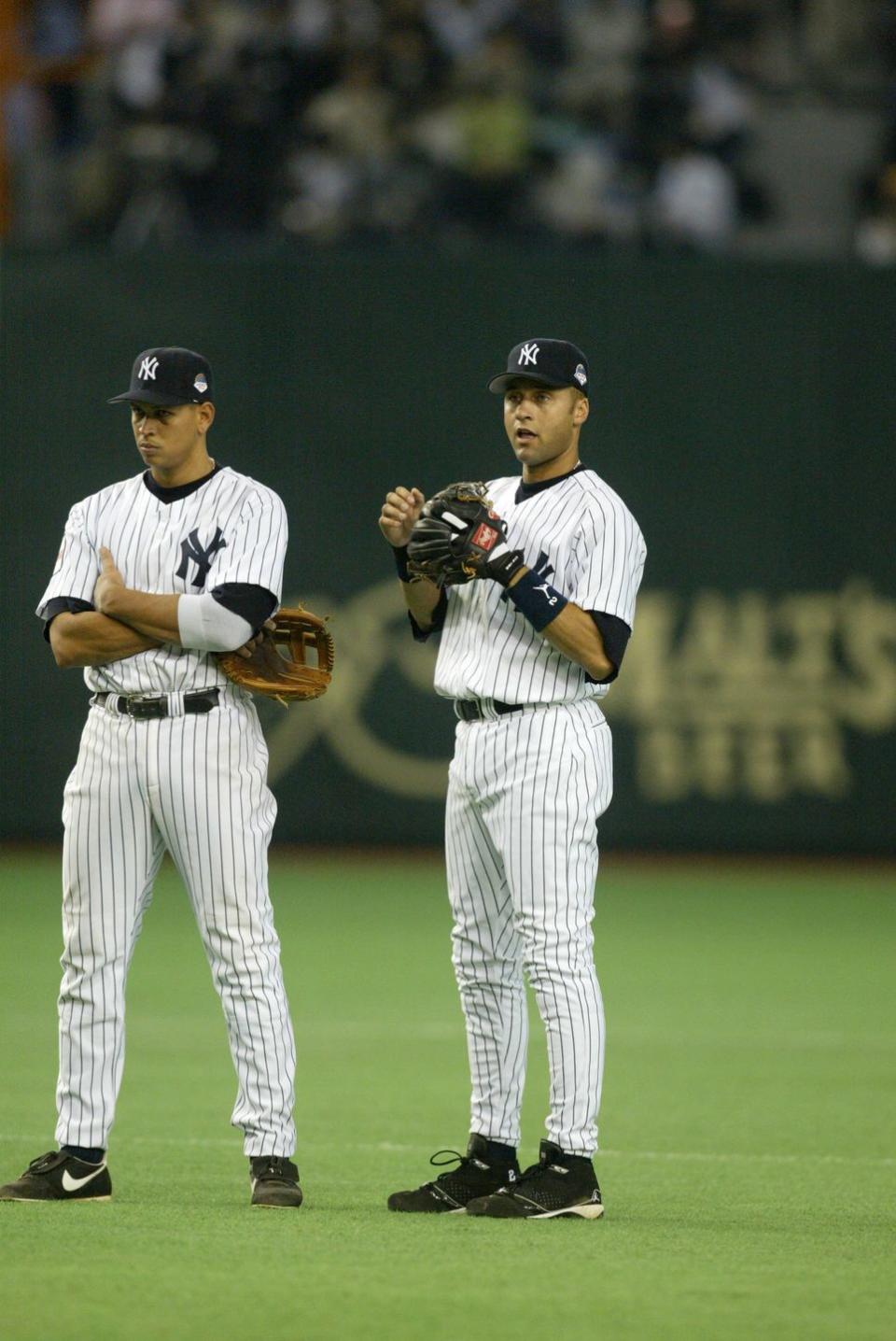How Derek Jeter and A-Rod Went From Baseball's Best Friends to a Falling Out

- Oops!Something went wrong.Please try again later.
- Oops!Something went wrong.Please try again later.
The ultimate baseball bromance was between Derek Jeter and Alex Rodriguez. In the late '90s, the media was absolutely feverish for the two baseball stars that had everything: the looks, the talent, and the adoring fanbase. Their real-life friendship was seen on the cover of magazines like GQ and Sports Illustrated—but it didn't last forever.
The fallout between Jeter and A-Rod gets a closer look in The Captain, a new seven-part docuseries showcasing Jeter’s career as the leader of the Yankees that began streaming on ESPN+ on July 18.
Here's what went down between the two sluggers, and what role Esquire played in the mess.
The Infamous Article
A story from a 2001 magazine is why Derek Jeter and Alex Rodriguez fell out of step—and that magazine is yep, Esquire.
The Esquire cover story of A-Rod, written by Scott Raab, featured A-Rod at the time that he had just left the Seattle Mariners, signing a $252 million dollar contract with the Texas Rangers. The deal made him the highest paid athlete in the world, even beating out Tiger Woods and Micheal Jordan.
The quotes from A-Rod added fuel to a then-non-existent fire. Jeter and Rodriguez were seen as good friends at the time; they even had similar come-ups in baseball, both being drafted as rookies fresh out of high school. The conversation, which gets replayed on the docuseries via the audio recording, starts with Rodriguez detailing his love and respect for Jeter. "No, there's not a rivalry at all," he says. "Not even, I mean rivalry? Like, ours is such a brotherhood that there's definitely no rivalry there. And it's weird, because even with my brother [we] have a little rivalry. But with Derek, I'm his biggest fan and I think it's vice versa."
As the conversation progresses, A-Rod turns to Jeter's character. "He's reserved, quiet," Rodriguez says. "Jeter's been blessed with great talent around him. He's never had to lead. He can just go and play and have fun. And he hits second—that's totally different than third and fourth in a lineup. You go into New York, you wanna stop Bernie and O'Neill. You never say, Don't let Derek beat you. He's never your concern."
These statements of not having to lead broke Jeter’s trust in his longtime friend. "Those comments bothered me because, like I said, I'm very, very loyal," Jeter says in the third episode of The Captain. "As a friend, I'm loyal. I just looked at it as, 'I wouldn't have done it.' And then it was the media. The constant hammer to the nail. They just kept hammering it in. It just became noise, which frustrated me. Just constant noise."
He continues: “You can say whatever you want about me as a player, that's fine, but then it goes back to the trust and the loyalty. This is how the guy feels, he's not a true friend, is how I felt. Because I wouldn't do it to a friend.”
Jeter said if these statements were an isolated incident then he would understand that "everybody makes mistakes." However, A-Rod doubled down on The Dan Patrick Show soon after.
The Now Frenemies
As you know, Rodriguez later became a part of the Yankees team in 2004—awkward!
When A-Rod first landed in New York it wasn't the most welcoming environment. "The first month, I didn't feel comfortable with me being there. I didn't feel like he [Jeter] felt comfortable either," Rodriguez says in a new interview for the docuseries.

(At the time, Jeter told the press they were still close, saying that Rodriguez had apologized to him and that he felt like it was sincere. Although this was a pretty standard response from Jeter—he’s known to be very matter of fact with the press and didn’t want distractions taking away from his focus on winning.)
A-Rod goes on to claim that he knew their friendship wouldn't ever be the same. "I think early on I was in that circle of trust," Rodriguez says. "I think that changed when I said some things he didn't like and that for him, broke the trust, and I think from that moment on it was never quite the same ever again."
Now, twenty-one years later it’s very clear that there was tension between the two, and it was obvious to the fans. Jeter was seen as the hero and Rodriguez was seen as the villain. “Derek Jeter wanted to be a Yankee. Alex Rodriguez wanted to be a star,” says Baseball American writer Alan Schwartz said in the docuseries. That made all the difference.
You Might Also Like

